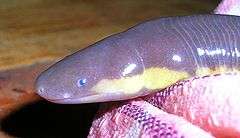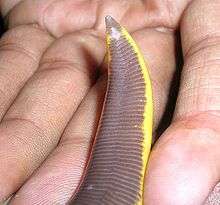Ichthyophiidae
| Ichthyophiidae | |
|---|---|
 | |
| Ichthyophis sp. from the Western Ghats | |
| Scientific classification | |
| Kingdom: | Animalia |
| Phylum: | Chordata |
| Class: | Amphibia |
| Order: | Gymnophiona |
| Family: | Ichthyophiidae Taylor, 1968 |
| Genera | |

The Ichthyophiidae are the family of Asiatic tailed caecilians or fish caecilians found in South and Southeast Asia as well as southernmost China.[1]
They are primitive caecilians, lacking many of the derived characters found in the other families. For example, their mouths are not recessed underneath their heads, they possess tails, and they have numerous scales on their bodies. However, they have two sets of muscles for closing the jaw, a feature unique to caecilians, but absent in the related family Rhinatrematidae.[2]
They lay their eggs in cavities in moist soil, where they hatch into larvae that seek out streams or underground seepages, before metamorphosing into adults. Some evidence indicates the females may protect their eggs until they hatch.[2]
Taxonomy
Family Ichthyophiidae
- Genus Caudacaecilia (possibly a synonym of Ichthyophis[1])
- C. asplenia - broad-striped caecilian
- C. larutensis - Larut Hills caecilian
- C. nigroflava - Kuala Lumpur caecilian
- C. paucidentula - Kapahiang caecilian
- C. weberi - Malatgan River caecilian
- Genus Ichthyophis
- I. acuminatus - pointed-headed caecilian
- I. atricollaris - Long Bloee caecilian
- I. bannanicus - Banna caecilian
- I. beddomei - yellow-striped caecilian
- I. bernisi - Indonesian caecilian
- I. biangularis - angular caecilian
- I. billitonensis - Billiton Island caecilian
- I. daribokensis - Daribok's striped caecilian
- I. bombayensis - Bombay caecilian
- I. davidi - Chorla giant striped caecilian
- I. dulitensis - Mount Dulit caecilian
- I. elongatus - elongated caecilian
- I. garoensis - Garo Hills caecilian
- I. glandulosus - Basilan Island caecilian
- I. glutinosus - Ceylon caecilian
- I. humphreyi - Humphrey's caecilian
- I. husaini - Husain's caecilian
- I. hypocyaneus - Bantam caecilian
- I. javanicus - Javan caecilian
- I. khumhzi - Khumhzi striped caecilian
- I. kodaguensis - Kodagu striped caecilian
- I. kohtaoensis - Koa Tao Island caecilian
- I. laosensis - Upper Laos caecilian
- I. longicephalus - long-headed caecilian
- I. malabarensis - Malabar caecilian
- I. mindanaoensis - Mindanao Island caecilian
- I. monochrous - Western Borneo caecilian
- I. moustakius - Manipur moustached caecilian
- I. orthoplicatus - Pattipola caecilian
- I. paucisulcus - Siantar caecilian
- Ichthyophis peninsularis
- Ichthyophis pseudangularis - Taylor's caecilian
- I. sendenyu - Sendenyu striped caecilian
- I. sikkimensis - Sikkimese caecilian
- I. singaporensis - Singapore caecilian
- I. subterrestris
- I. sumatranus - Sumatran caecilian
- I. supachaii - Supachai's caecilian
- I. tricolor - three-colored caecilian
- I. youngorum - Doi Suthep caecilian
- Genus Uraeotyphlus
- U. gansi - Gansi caecilian
- U. interruptus - Kerala caecilian
- U. malabaricus - Malabar tailed caecilian
- U. menoni - Menon's caecilian
- U. narayani - Narayan's caecilian
- U. oommeni - Bonnacord caecilian
- U. oxyurus - red caecilian
References
- 1 2 Frost, Darrel R. (2013). "Ichthyophiidae Taylor, 1968". Amphibian Species of the World 5.6, an Online Reference. American Museum of Natural History. Retrieved 23 April 2013.
- 1 2 Nussbaum, Ronald A. (1998). Cogger, H.G.; Zweifel, R.G., eds. Encyclopedia of Reptiles and Amphibians. San Diego: Academic Press. p. 55. ISBN 0-12-178560-2.
- Nussbaum, Ronald A. and Mark Wilkinson (1989). "On the Classification and Phylogeny of Caecilians." Herpetological Monographs, (3), 1-42
- San Mauro, Diego; David J. Gower; Oommen V. Oommen; Mark Wilkinson; Rafael Zardoya (November 2004). "Phylogeny of caecilian amphibians (Gymnophiona) based on complete mitochondrial genomes and nuclear RAG1". Molecular Phylogenetics and Evolution. 33 (2): 413–427. doi:10.1016/j.ympev.2004.05.014. PMID 15336675.
- San Mauro, Diego; Miguel Vences; Marina Alcobendas; Rafael Zardoya; Axel Meyer (May 2005). "Initial diversification of living amphibians predated the breakup of Pangaea" (PDF). American Naturalist. 165 (5): 590–599. doi:10.1086/429523. JSTOR 10.1086/429523. PMID 15795855.
- San Mauro, Diego; David J. Gower; Tim Massingham; Mark Wilkinson; Rafael Zardoya; James A. Cotton (August 2009). "Experimental design in caecilian systematics: phylogenetic information of mitochondrial genomes and nuclear rag1". Systematic Biology. 58 (4): 425–438. doi:10.1093/sysbio/syp043. PMID 20525595.
- Frost, Darrel R. 2004. Amphibian Species of the World: an Online Reference. Version 3.0 (22 August 2004). Electronic Database accessible at https://web.archive.org/web/20071024033938/http://research.amnh.org/herpetology/amphibia/index.php. American Museum of Natural History, New York, USA
- AmphibiaWeb: Information on amphibian biology and conservation. [web application]. 2004. Berkeley, California: AmphibiaWeb. Available: http://amphibiaweb.org/. Retrieved 26 August 2004